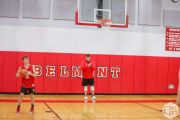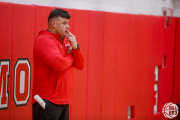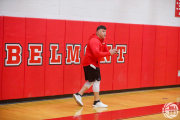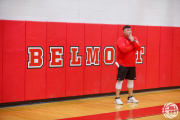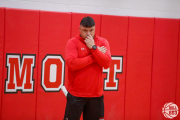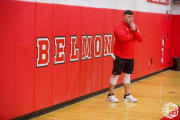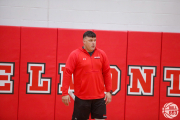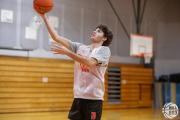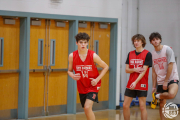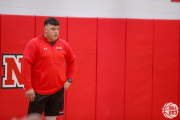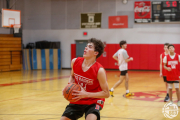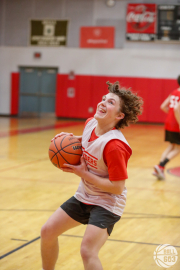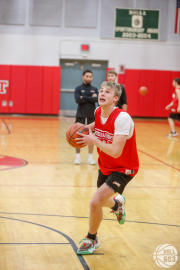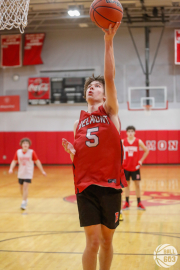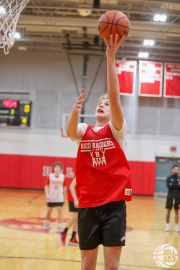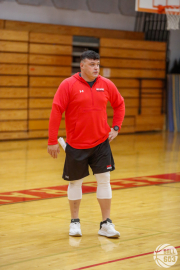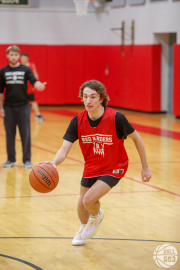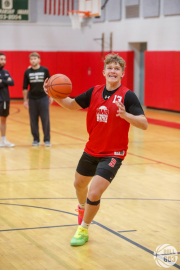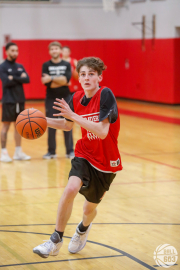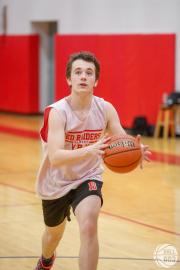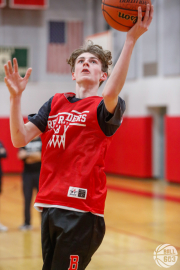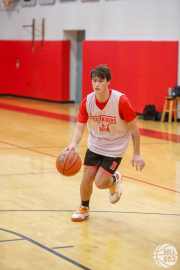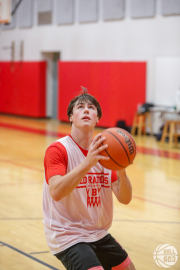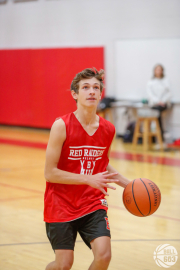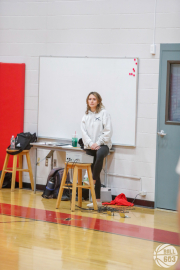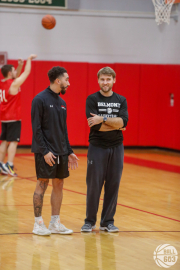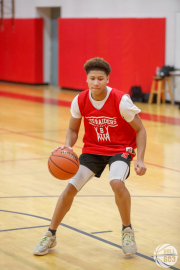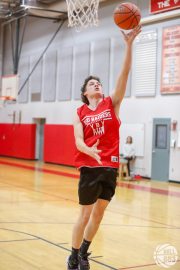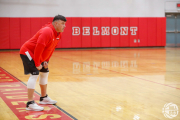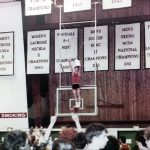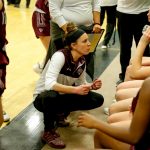By Mike Whaley
 There was a time when Farmington High School boys basketball was held in high regard across New Hampshire. Those teams guided by Hall of Fame coach Mike Lee earned a reputation for being tough, fast-paced and relentless. Games in their steamy old gymnasium were a popular destination for coaches, players and fans from all corners of the state.
There was a time when Farmington High School boys basketball was held in high regard across New Hampshire. Those teams guided by Hall of Fame coach Mike Lee earned a reputation for being tough, fast-paced and relentless. Games in their steamy old gymnasium were a popular destination for coaches, players and fans from all corners of the state.
But Lee retired in 1998 after 21 seasons with over 300 wins and two state championships (1984, 1988). Since his departure there have been eight coaches and a pretty meager postseason haul: one trip to the semis (2001) and four to the quarterfinals. Not a sniff of a state championship.
The Tigers may be turning the corner under its current coach, Adam Thurston, whose patience is paying off in his ninth year. He is finally seeing some returns for his efforts.
Farmington is 11-2 in Division IV – ranked fourth with Profile behind Littleton, Concord Christian and Woodsville. It is one of the program’s best starts since the Lee era. The Tigers have done what they’ve done despite missing key players at different junctures due to injury and suspensions. That has only served to give other players more experience and make the team deeper than most in D-IV. They are just now getting everybody back.

Farmington plays a withering man-to-man defense and features both size (three players 6-foot-4 or taller) and sound guard play with outside shooting range. There is good scoring balance with six players averaging six points or better a game.
The million dollar question is can this team advance deep into the tournament?
Last year most of this squad was on the floor when Farmington won its first playoff game under Thurston, a convincing 51-31 victory at Groveton in the 8-9 game. Their season ended in the quarters at No. 1 and unbeaten Woodsville, 60-47. It was a five-point game with two minutes to go, before the Engineers were finally able to pull away. Woodsville went on to win its second straight D-IV state title.
“It’s been a labor of love is kind of how I look at it,” said Thurston, a 2007 Farmington HS grad and former player. “When I first took over the program I was 25 at the time and, quite frankly, wasn’t ready to take over a varsity program.”
Because he was the eighth coach in 17 years, his immediate goal was to build continuity. “I was coaching JV at the time,” Thurston said. “I went through the program, so that was something I saw over the years.”
He said he wasn’t concerned about wins and losses. “It was about taking a more consistent approach about things and getting my message across,” Thurston said. “It took a lot of years. Looking back, I thought it would take five to six years to get there, and that’s about what it took.”
There was always talent, but not the commitment. Over the years, Thurston had to deal with outside forces – losing kids to suspensions, grades, apathy. “It’s been a struggle,” he said. “Last year was the year we finally got over the hump.”
Most of that team returned. With several additions, it has turned the Tigers into a contender.

“When we were freshmen, we had a lot of talent on the team,” said senior big man Jordan Berko, the Tigers’ tallest player at 6-foot-6. “We couldn’t mesh together as we do now. I feel like a lot of the guys on the team are really close friends outside of basketball. Everybody really knows each other. There were some guys my freshman year who weren’t as dedicated to the sport so they fooled around outside of school and got into trouble or skipped practice or just went through the motions at practice. But now everything is fast-paced. We are focused.”
Thurston saw it coming as early as 2019 when the short-handed Tigers lost at Pittsfield in the first round of the tournament, 61-49, but it was a two-point game with four minutes to go. In 2020, they made a playoff trip to Groveton, only to lose a tight battle in the final minutes. But it was the same old same old – Berko was injured and a suspended starter missed the game.

Last year’s respectable playoff showing has given the team confidence. “It was awesome to see that we could make it that far,” said senior guard Matt Savoy. “It gave us a dose of energy this year – wanting to get past that this year and going all the way; or at least trying.”
A big influence, in Thurston’s mind, is the commitment to play off season, particularly over the summer. “When I took over I was knocking on eighth-graders’ doors with waivers to get them to play summer league,” he said. “I didn’t have enough high school kids. Now I’m turning kids away because we don’t have enough summer league jerseys. So that’s the big difference right there. That’s been the last two to three years we’ve had consistent off-season numbers. We’ve had less kids coming and going; kids messing up from time to time.”
Even though there were early season troubles, Farmington was able to figure things out. Two rotation players missed some time in December and January, and valuable junior starter Shawn Murphy suffered an injury that caused him to miss three games. He’s currently working his way back into the lineup.
“It allowed for some younger guys to move up, some guys with lesser roles to get their shot at it,” Thurston said. “It’s paid dividends down the stretch.”
Farmington is deeper for it, able to realistically play as many as nine or 10 players. “We really haven’t shown what we truly can be yet,” Thurston said. “We’re still very much an unfinished product.”

Berko and Savoy lead the way as senior co-captains, averaging 15.3 and 8.8 points per game, respectively. Junior point guard Aiden Place (10.0 ppg) and senior guard Brian Boisvert (11.2 ppg) are two pleasant surprises in the backcourt, while Murphy (6.1 ppg) at 6-0 is a key contributor and a potential No. 2 scorer when he is healthy. Senior Luke Cardinal and junior Dylan Zappala are the Tigers’ 6-4 guys off the bench, while junior Cody Brazee and sophomore Noah Elwell are two players who benefited – and delivered – from increased playing time when others were either injured or suspended.
What makes Farmington so difficult to defend is that their scoring comes at you from so many different directions. Berko is the leading scorer, but he is unselfish to a fault, willing to get the ball to an open man first. It’s not uncommon for the Tigers to have three or four scorers in double figures, and not always the same names.
Thurston knew coming into the season what he was getting from Berko, Savoy and Murphy. Berko provides great defense and a double-double, Savoy is that all-around Swiss Army Knife type guy, and Murphy, when healthy, is a player who can be a consistent double-figures scorer.

The surprises have been Place, Bosivert and Brazee. Place has embraced the point guard position where he distributes the ball well, plays tough defense and is an above average 3-point shooter. He leads the team in steals and assists. “In my opinion he’s been our biggest surprise,” Thurston said.
When players were out, Boisvert added some much needed offense and Brazee has been a pleasant offensive revelation off the bench.
Thurston recently pulled each player aside individually to discuss their roles down the stretch with the team returning to full strength. “The first thing is that it’s made things in practice very competitive, which is great,” he said. “The starters versus the bench are playing each other within one or two possessions. That’s great. We have unreal depth. I feel comfortable on any given night going 10 deep. I don’t think other teams in the division can do that.”
The schedule beefs up in February, which is where the Tigers will find out what they are made of. Thurston figures they need to run the table to have a shot at a top-four spot, which will allow them home court until the tournament moves to a neutral site for the semis and final.
That took a hit on Tuesday with a 69-56 loss at Concord Christian, a game that was tied at 38-all late in the third quarter before CCA pulled away.
Actually two losses may keep them in the top four with some of the top northern teams beating each other up down the wire. Littleton (13-0), Woodsville (9-1), Profile and Groveton (9-3) play each other at least once before the season ends next week. Woodsville and Groveton meet twice. Last year as the No. 9 seed, Farmington had to make two three-hour trips in the same week to Groveton and Woodsville. That is something Thurston would like to avoid.

“We didn’t take care of business early on in the year, which we were certainly capable of,” Thurston said of last year. “We didn’t win those 50/50 games that we needed to. In Division IV that matters a ton. That was a big lesson coming out of that; we need to start fast, which we’ve done this year, obviously.”
Looking ahead, the Tigers have big games with Portsmouth Christian (their first loss) on Saturday and Newmarket to end the regular season on Feb. 10.
The PCA loss was the one game where the normally relentless man-to-man defense went complacent at the wrong time. “We need to get that out of our system the rest of the way,” Thurston said. “Grooming those things on the defensive end is going to be huge for us.”
Now that Farmington is back in the contender conversation, the Tigers are feeling good about themselves and their potential.
“At the [Farmington] 500, [the youth program in town], they’re always talking about ‘oh, the high school team has a game. You should go and watch it with your parents,’” said Savoy.
“I like being in the conversation,” Berko said. “When we show up for games during warm-ups we look out in the crowd and it’s totally full – both sides of the gym. There’s people there to watch. With us playing well and getting more fans, I like that.”
Who wouldn’t?
Got a story idea for Jam Session – email whaleym25@gmail.com


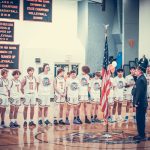
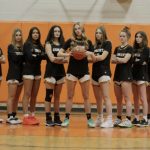



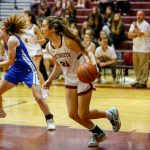
 Unlike most athletes, Avery Romps has a built-in trainer and coach in her dad, Mike. Pretty sweet deal if you can get it.
Unlike most athletes, Avery Romps has a built-in trainer and coach in her dad, Mike. Pretty sweet deal if you can get it.
 Mike remembers a lot happening in 2001. It was his first year teaching and coaching in Dover, Jackie got pregnant with their older daughter, Samantha, and they got married.
Mike remembers a lot happening in 2001. It was his first year teaching and coaching in Dover, Jackie got pregnant with their older daughter, Samantha, and they got married.  Avery recalls the four-team rec league being fun. The travel ball allowed the girls to play against better competition. “That helped us improve at an early age,” she said.
Avery recalls the four-team rec league being fun. The travel ball allowed the girls to play against better competition. “That helped us improve at an early age,” she said. Avery laughs at some of those memories, which weren’t always rosy. “At times, it was not fun,” she said. “I improved a lot mentally. If a coach is going to yell at me, I’m that much mentally stronger now.”
Avery laughs at some of those memories, which weren’t always rosy. “At times, it was not fun,” she said. “I improved a lot mentally. If a coach is going to yell at me, I’m that much mentally stronger now.”



 Mitchell Roy has a plan. It is a four-year project to elevate the Profile High School boys basketball team from the Division IV cellar to the championship podium – something that has happened just once in school history (2004).
Mitchell Roy has a plan. It is a four-year project to elevate the Profile High School boys basketball team from the Division IV cellar to the championship podium – something that has happened just once in school history (2004).
 Roy got to be part of coach Kevin Bettencourt’s program at Endicott as a manager and then student assistant. The Gulls did well, advancing to three Commonwealth Coast Conference championship games and a NCAA Division III Sweet 16. There he was able to work with some tremendous New Hampshire players like Portsmouth’s Kamahl Walker, Pelham’s Keith Brown and Dover’s Ty Vitko.
Roy got to be part of coach Kevin Bettencourt’s program at Endicott as a manager and then student assistant. The Gulls did well, advancing to three Commonwealth Coast Conference championship games and a NCAA Division III Sweet 16. There he was able to work with some tremendous New Hampshire players like Portsmouth’s Kamahl Walker, Pelham’s Keith Brown and Dover’s Ty Vitko.







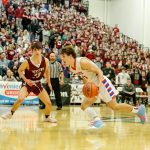
 If you’ve seen Tyler Bike play basketball and you’re unaware of his family’s impressive gene pool, you’d still agree he’s pretty darn good. But if you knew about the gene pool, you might just say to yourself, “Well, that certainly explains that.” Which, of course, it does, except genes alone don’t get the job done. Tyler Bike knows that.
If you’ve seen Tyler Bike play basketball and you’re unaware of his family’s impressive gene pool, you’d still agree he’s pretty darn good. But if you knew about the gene pool, you might just say to yourself, “Well, that certainly explains that.” Which, of course, it does, except genes alone don’t get the job done. Tyler Bike knows that.


 Growing up, Keith certainly soaked in being the son of a college coach, starting as a ball boy for Dave’s team. “I was the slowest kid every time I stepped on the court,” Keith said. “I had a good knowledge of the game. A lot of that had to do with me watching my dad’s teams and players growing up. Just being the kid on the bench.”
Growing up, Keith certainly soaked in being the son of a college coach, starting as a ball boy for Dave’s team. “I was the slowest kid every time I stepped on the court,” Keith said. “I had a good knowledge of the game. A lot of that had to do with me watching my dad’s teams and players growing up. Just being the kid on the bench.”
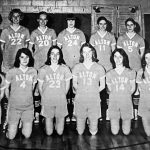
 (Note: Little Alton High School was the state’s first small-school girls basketball power in the 1970s. They won three state championships in four years, amassing at one stretch a 64-game winning streak. It seems fitting to recall those Alton pioneers on the 50th anniversary of Title IX – the 1972 federal anti-discrimination, civil rights law, which helped to close the athletic gender gap and led to a considerable increase in the number of females participating in organized sports in high schools and universities. Quotes from the main Alton players are from a 1988 story that appeared in the old Rochester (N.H.) Courier. None of the women responded to recent requests for comment for this story.)
(Note: Little Alton High School was the state’s first small-school girls basketball power in the 1970s. They won three state championships in four years, amassing at one stretch a 64-game winning streak. It seems fitting to recall those Alton pioneers on the 50th anniversary of Title IX – the 1972 federal anti-discrimination, civil rights law, which helped to close the athletic gender gap and led to a considerable increase in the number of females participating in organized sports in high schools and universities. Quotes from the main Alton players are from a 1988 story that appeared in the old Rochester (N.H.) Courier. None of the women responded to recent requests for comment for this story.)








 By Mike Whaley
By Mike Whaley
 Ami and Isabella, however, were constant teammates at Brady in softball and basketball. They were key contributors to the school’s first state girls’ basketball championship team in 2021. The Giants beat Kennett in the Division II final, 52-50, on Isabella’s steal and layup in the waning seconds.
Ami and Isabella, however, were constant teammates at Brady in softball and basketball. They were key contributors to the school’s first state girls’ basketball championship team in 2021. The Giants beat Kennett in the Division II final, 52-50, on Isabella’s steal and layup in the waning seconds.
 Shaw is glad he has Ami and Isabella on his team. Ami is the point guard, while Isabella is a shooting or off guard.
Shaw is glad he has Ami and Isabella on his team. Ami is the point guard, while Isabella is a shooting or off guard.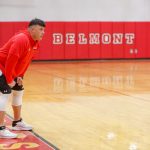
 By Mike Whaley
By Mike Whaley

